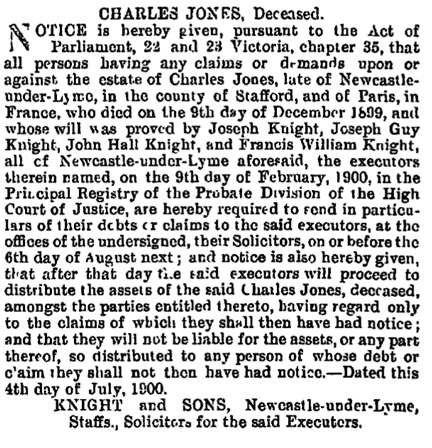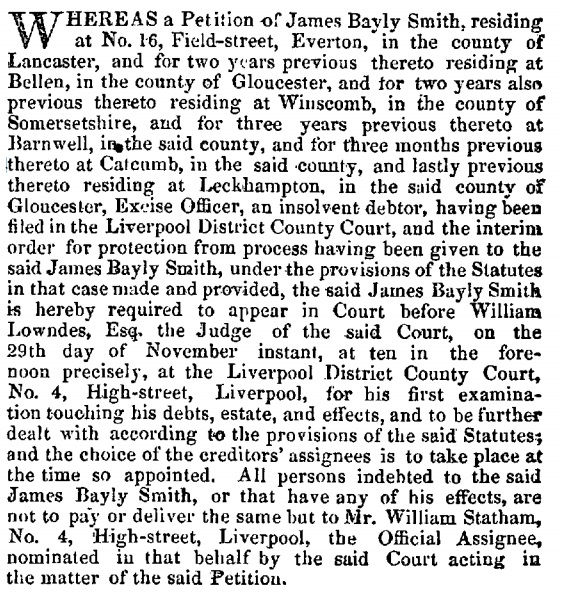How to use The Gazette when researching family history
Geoff Culshaw, family researcher, describes how The Gazette archives have uncovered key facts about his forebears.
Family historians will be familiar with the main primary sources that are used in the pursuit of their hobby: civil registration certificates, parish registers, censuses and wills.
If you are lucky in your research, you may be able to trace your line back several generations using just these sources. However, most people will find that they need to refer to other materials as well to find out more about an ancestor.
This is where The Gazette can be very useful. Here, I’ll describe some of the ways in which I have made use of its archives in my research.
What can deceased estates notices reveal?
Researching a Victorian man named Charles Jones, with very little other knowledge about him, was a formidable challenge. All my brother and I knew about him was that he was active as a civil engineer in France, that he died circa 1900, and the name of his French wife. Thinking that he was likely to have left a will, which may well have been proved in England, we decided to search the probate notices in The Gazette. It was easy to do this using the search facility, and to our delight, we came up trumps. In an issue dated 6 July 1900 (Gazette issue 27208), we found the notice pictured right.
At a stroke we found out that our man had lived in Newcastle-Under-Lyme and Paris, as well as the date of his death. Using this information as the basis for our research, we went on to obtain a copy of Charles's will and to research his family. Not only that, but a visit to Newcastle-Under-Lyme enabled us to find a collection of his personal and business letters, which in turn led us on to find out more about this most interesting man and his career.
What can insolvency notices tell the researcher?
There are a wide range of notices in The Gazette that can be used by family historians in a variety of ways. I'm perhaps regretful to say that notices of insolvency proceedings have proved of great value to me several times in my research.
James Bayly Smith (1800-1850) was my third great grandfather and an excise officer. Although he was born in Colchester, he was serving in Liverpool by 1847. I already knew this before finding a notice of insolvency proceedings in a London Gazette issue of 23 November 1847 (Gazette issue 20797), pictured below.

Through this notice, I could see that my ancestor had claimed insolvent debtor's relief and his address and place of residence for the two previous years. James's misfortune was certainly my good fortune!
Both of the above examples date from the 19th century, but publication of The Gazette started in the 17th century, during the reign of Charles II, so it can be used to trace information over the last three-and-a-half centuries. Thus I have used the website to search for other cases of insolvency in the 18th century.
In a 21 May 1743 London Gazette issue, ‘Element Jones, late of Allhallows upon the Wall, London, Carpenter’ was included in a list of people claiming insolvent debtor's relief, ‘being Prisoners in the King’s Bench Prison in Southwark in the County of Surry [sic]’ (Gazette issue 8228).
And on 29 July 1749, ‘Joseph Collyer, late of Ludgate Street, London, Bookseller’ was included in a list of people claiming insolvent debtor's relief, ‘having surrendered [himself] to the Warden of the Prison of the Fleet, London’ (Gazette issue 8871).
In an 18 October 1686 issue, another notice concerning one of my forebears appeared:
'Stolen on Monday night last the 18th Instant, out of the Yard of Mr. John Banks Timber-Merchant, at St. Pauls Wharfe, a Crane Rope cut, and the Ram head of Iron, and a large Wheel of Brass: These are to desire either Smiths, Founders, Brasiers, or others, to whom the said Goods may be exposed to Sale, to stop them, and the Party, and give Notice thereof to Mr. Banks aforesaid, they shall have 20s. Reward' (Gazette issue 2183).
John Bankes looms large in my family history, as a London builder who participated in the rebuilding of the City of London after the Great Fire of 1666 (Gazette issue 85). I already knew much about his activities from a variety of sources, but this notice of 1686 is likely to be the only surviving source that would inform me of this theft from his business premises, and the reward that he offered in an effort to catch the perpetrator.
I could go on further in demonstrating the value of The Gazette in family history, but hopefully my point is made. Family historians are fortunate to have a freely available resource that can provide such a range of information, about so many people in a great variety of situations, across several hundreds of years.
About the author
Geoff Culshaw has 30 years’ experience as a family historian. Using a range of sources to research his maternal and paternal lines, his main focus has been the John Bankes pedigree. He has had a number of articles published in family history magazines and journals, and was previously the editor of the Shropshire Family History Society's journal. See www.geoffsgenealogy.co.uk.
